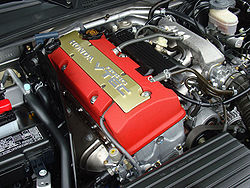Honda F20C engine
The F20C and F22C1 are inline-4 engines produced by Honda. They are one of the few Honda 4-cylinder automobile engines that are designed to sit longitudinally for rear wheel drive.
These engines are a distant relative to the F-series engines found in the mid 1990s Honda Accord and Prelude.[1] To get most out of the compact sized engine, Honda engineers utilized technology derived from Honda's racing engines.[2] The F20C and F22C1 have two overhead cams with roller followers, a ladder-frame main bearing stiffener, a VTEC system for both the intake and exhaust camshaft, Fiber-Reinforced Metal cylinder liners (FRM), molybdenum disulfide-coated piston skirts for reduced friction, and uses a timing chain.
The VTEC system consists of two separate cam lobe profiles. Variable cam phasing is not used. Roller followers are used to reduce friction in the valvetrain. The rocker arms are constructed using metal injection molding.
The engine block is constructed of aluminum with fiber-reinforced metal sleeve. A timing chain drives an intermediate gear, which drives the cams. The pistons are forged aluminum. The intake plenum was designed with minimal volume for fast engine response, and a 14 lb flywheel was fitted until 2004. A high-flow catalyst is supplied along with an exhaust air-injection system, which greatly decreases catalyst light-off time and cold emissions.
F20C
- Displacement: 1,997 cc (121.9 cu in)
- Compression: 11.7:1 (Japan), 11.0:1 (North America, Europe)
- Bore: 87 mm (3.4 in)
- Stroke: 84 mm (3.3 in)
- Rod Length: 153 mm
- Rod/stroke ratio: 1.82
- Power:
- JDM 250 PS (183.88 kW) @ 8,600rpm & 22.2kgm (217.71 Nm) @ 7,500 rpm
- USDM 237 HP @ 8,300 rpm; 153 ft lb, 207 Nm @ 7,500 rpm
- Rev limit: 9000 rpm
- VTEC: "around 6000 rpm" [3]
The F20C was designed with high maximum rpm capability in mind, for increased power output; redline is at 8800 rpm, with VTEC engagement at 6000 rpm. Its relatively long stroke of 84mm results in a mean piston speed of 4965 ft/m, or 25 m/s, second highest than any other production car to date.[4] It is only beaten by the B7 Audi RS4 (2006-2008). Power output is 240 bhp (179 kW) at 8300 rpm in North America and Europe. The Japanese version, which has a higher compression ratio, is capable of 250 PS (247 bhp) at 8600 rpm. Honda's F20C Engine won a spot on Wards' 10 Best Engines List four times, in 2000, 2001, 2002 and 2003.
The engine displaces 1,997 cc (121.9 cu in), lending to the Honda S2000's name. This method of naming follows suit with the rest of the Honda S roadsters (i.e. Honda S500, S600, and S800).
Applications:
- 1999-2005 Honda S2000 (Japan)
- 2000-2003 Honda S2000 (North America)
- 1999–2009 Honda S2000 (United Kingdom, Europe, Australia)
The F20C produces the highest specific output for any naturally aspirated 2.0L piston engine in a car priced under US$100,000, at 125 hp (93 kW) per liter, ahead of the SR16VE N1 found in the homologation version of JDM Nissan Pulsar producing 197 bhp (147 kW) for a specific power of 123.45 bhp (92.06 kW) per liter. The F20C held the record for producing the highest specific power output for any mass production naturally aspirated piston engine.
F22C1

- Displacement: 2,157 cc (131.6 cu in)
- Compression: 11.1:1 (North America, Europe)
- Bore: 87 mm (3.4 in)
- Stroke: 90.7 mm (3.57 in)
- Power:
- USDM 240 HP @ 7,800 rpm; 162 ft lb @ 6,500 rpm[5] (revised to 237 hp (177 kW) @7800 rpm in 2005 per SAE Certified Power standard)[6]
- Rev limit: 8200 rpm
- VTEC: "6000 rpm" [7]
In 2004, Honda produced a stroked 90.7 mm (3.57 in) version of the F20C, increasing displacement by 160 cc (9.8 cu in) to 2,157 cc (131.6 cu in). Dubbed the F22C1, it was originally designed for the North American market being introduced for the 2004 model year. Maximum power output was maintained at 240 hp (180 kW) @7800 rpm. Rated torque increased from 153 lb⋅ft (207 N⋅m) at 7500 rpm for the F20C to 162 lb⋅ft (220 N⋅m) at 6500 rpm for the F22C. The redline was reduced from 8900 rpm to 8200 rpm, mandated by the longer travel distance of the pistons. Peak horsepower output was originally rated identical to the F20C, with "overall powerband characteristics strengthened 4% to 10% between 1000 -8000 rpm".[8]
The F22C1 was used exclusively in the North American market for 2004 and 2005 with the F20C being used in all other markets. In 2006, the engine fully replaced F20C engines in the Japanese market as well which resulted in a drop in rated power output from 250 PS (247 bhp) to 242 PS (239 bhp). Outside Japan and the United States, the F20C continued to be the only available engine.
Applications:
- 2004–2009 Honda S2000 (F22C1)(North America)
- 2006–2009 Honda S2000 (Japan)
See also
- List of Honda engines
- Listen to a F20C in operation:
References
- ^ "Technology to Increase Power Output of a Low-Emission/High-Efficiency Engine". Spark-Ignition Engine Technology. July 1999.
The model F20C is the upscale version of the F20B which has been the powerplant of the Honda Accord.
{{cite journal}}:|access-date=requires|url=(help) - ^ JDM Spec Engines - Honda F20C Engine
- ^ "2004 Honda S2000 -- Powertrain Part 2". Honda. Retrieved 1 April 2014.
- ^ http://hondaswap.com/members-lounge/engines-fastest-piston-speeds-72614/
- ^ "Honda S2000 Receives Enhanced Power and Improved Handling for 2004". Retrieved 1 April 2014.
- ^ "2006 Honda S2000 Summary". Honda.
- ^ "2004 Honda S2000 -- Powertrain Part 2". Honda. Retrieved 1 April 2014.
- ^ "Honda S2000 Receives Enhanced Power and Improved Handling for 2004". Retrieved 1 April 2014.
